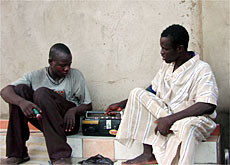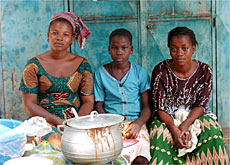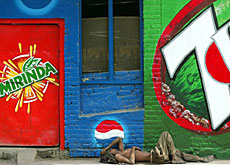ICTs link rural Mali to the outside world

Out of the 11.3 million people living in Mali, roughly 80 per cent are cut off from the outside world because of the lack of a communications infrastructure.
But many development specialists believe rural radio and multimedia centres could hold the key to integrating this poor nation into the information society.
There is only one daily newspaper in Mali and by the time it has travelled thousands of kilometres – from the capital Bamako to a desert city like Timbuktu – the news is generally out-of-date.
Moreover only around a quarter of the population can read or write and less than one per cent of all Malians own a mobile or fixed-line telephone, according to the Swiss Association for International Cooperation, or Helvetas.
“A rural commune in Mali can stretch for dozens of kilometres and be made up of over 20 villages,” the head of Helvetas’ office in Mali, Melchior Lengsfeld, told swissinfo.
“You don’t have roads, people don’t have transport, nobody has access to a telephone and you can’t just walk to get your information… so it’s not easy,” he added.
Rural radio
But while the vast majority of Malians do not have access to information and communication technologies (ICTs) like computers, television and telephones, around 18 per cent of them do own a radio.
And according to Lengsfeld, community radio – which is locally broadcast and based on a public service model – is an extremely effective means of broadcasting information to large groups of people in rural areas.
“Radio plays a large role in our decentralisation promotion programmes,” Lengsfeld said.
“There are around 700 communes in Mali and they are only a few years old, so people have to learn what it means to be a citizen and to elect government representatives in a country where there is no democratic tradition on a local level,” he added.
The radio broadcasts commissioned by Helvetas also focus on women’s and youth issues, which are designed to get traditionally marginalised groups interested in the political process.
Cyber cafés
As part of its decentralisation programme, Helvetas also hopes to have the first in a series of satellite-linked cyber cafés up and running in the rural city of Bougouni – where landlines are scarce – by January.
“The idea is to have private a operator that would run a small centre where people could have access to email, internet, and maybe a telephone, although this is not for certain,” Lengsfeld explained.
“Once the technology works, there would be the possibility to mirror signals to the surrounding areas and there could be satellite stations in villages and communes in the nearby regions,” he added.
Hybrid networks
The United Nations Educational, Scientific and Cultural Organization (Unesco) has taken Helvetas’ model one step further by combining rural radio and cyber cafés into what it calls “community multimedia centres” or CMCs.
The agency has set up two of these hybrid facilities in the rural cities of Kayes and Koutiala, where visitors can surf the internet, use e-mail and get information, which is then broadcast via community radio stations in the regional language.
“We really want to enable rural radio stations to get information through the internet and then make it available to the people on a grassroots level,” the programme specialist at Unesco’s office in Mali, Yao Ydo, told swissinfo.
“This will allow them to multiply and diversify their choices because even though they live in rural areas, people need to know what is going on in the world, because information influences their lives, and we can’t ignore it,” he added.
Financing
Both sets of projects currently receive funding from the Swiss government, but Helvetas and Unesco insist that such ventures must be self-sustainable and, preferably, commercially viable in order to truly work.
And they hope that the private sector will be willing to contribute to the initiatives.
“It would be great to have more redistribution of information online and I’m sure this will come in five to ten years, but it’s a huge investment and if nobody pays, it won’t happen,” said Lengsfeld.
swissinfo, Anna Nelson in Bamako, Mali
Of Mali’s population of 11.3 million, roughly 80 per cent are cut off from the outside world because of a lack of communications infrastructure.
Around three quarters of the population cannot read or write and less than one per cent owns a mobile or fixed-line telephone.
A huge surge in the number of internet users in the country – from 2,000 in 1998 to 30,000 in 2001 – has shown that availability of ICTs is growing, but access to computers remains scarce.
Eighteen per cent of people living in Mali own a radio, while less than two per cent own a television.
The country’s hundreds of rural districts, or communes, were established in recent years to promote sustainable development at the local level.
Development specialists believe information and communication technologies (ICTs), like community radio and multimedia centres could hold the key to integrating Mali into the Information Society.
The Swiss Association for International Cooperation, or Helvetas, uses rural radio to broadcast information about political, economic and social issues to marginalised groups.
Like the United Nations Educational, Scientific and Cultural Organization, Helvetas also hopes to bring the internet and e-mail to remote villages via a satellite network.

In compliance with the JTI standards
More: SWI swissinfo.ch certified by the Journalism Trust Initiative


You can find an overview of ongoing debates with our journalists here . Please join us!
If you want to start a conversation about a topic raised in this article or want to report factual errors, email us at english@swissinfo.ch.